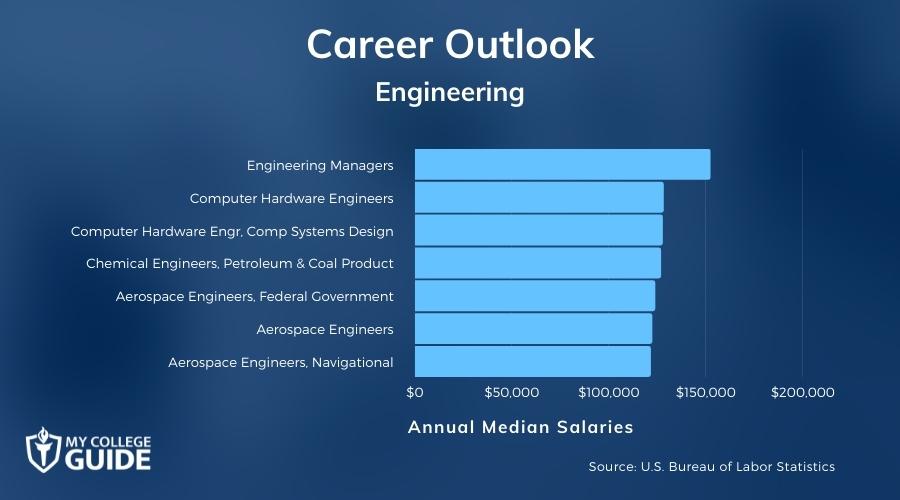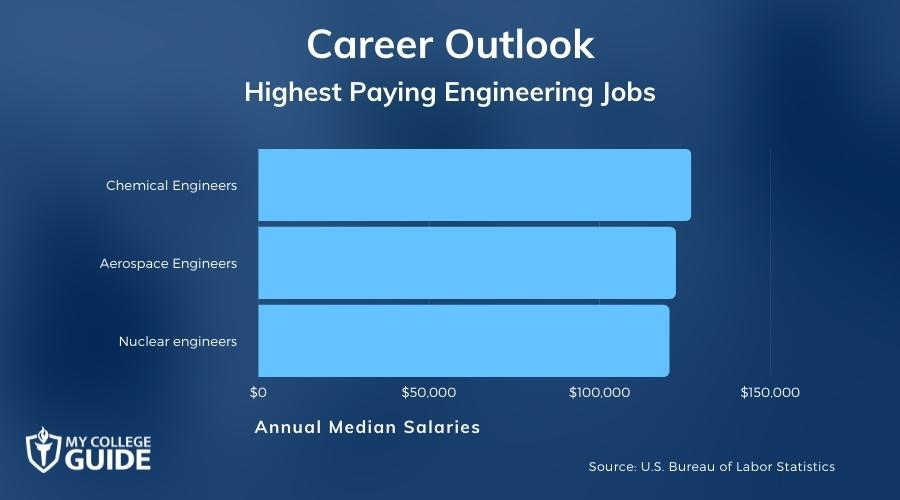If you are interested in fast-paced, challenging work that allows you to put science to good use, then pursuing one of the many engineering careers may be a good option for you.

Engineering allows you to design and solve tough problems using scientific knowledge.
Editorial Listing ShortCode:
This diverse field is filled with opportunities, and as with education careers or careers in English, there are several career paths in engineering you can choose from after graduating.
What Can You Do With an Engineering Degree?

When working in the engineering field, you may assist companies and government agencies with technical issues, mechanical and electrical development, or project management.
From industrial and construction careers to occupations within the medical industry, there are several different paths that you can choose from after graduating from your degree program. You can opt to work with the environment and become an environmental engineer or perhaps you want to work as a chemical engineer. If you enjoy designing and building, mechanical engineering may be a good fit for you.
Editorial Listing ShortCode:
Engineering is an expansive field and contains many high-level career opportunities. According to the U.S. Bureau of Labor Statistics, most engineer careers offer higher-than-average salaries across all occupations, making engineering a lucrative and rewarding degree choice. It is important to remember that salaries can vary based on your education and skill level.
5 Things You Can Do with a Degree in Engineering
Engineering is a broad career path with many different specialties. With an engineering degree, you can choose to specialize in mechanical, chemical, electric, civil, and environmental engineering to name a few. Keep in mind, some jobs available may require additional degrees or experience.
1. Mechanical Engineers

Mechanical engineers work with mechanical and thermal products. They build, repair, and troubleshoot these mechanical and thermal devices.
Mechanical engineers research and experiment with various problems that can be solved with the use of a new device or tool. They also modify and upgrade tools and systems to work more efficiently and create prototypes. Common career ideas include positions within machinery manufacturing, transportation equipment, engineering firms, and transportation manufacturing.
2. Chemical Engineer

Chemical engineers work with manufacturing plants to design, develop, implement, and troubleshoot the production of chemicals, fuel, pharmaceuticals, and more.
They assist in creating manufacturing equipment and products that use chemicals. This includes researching chemical compounds, analyzing various processes, and creating safety best practices.
3. Electrical Engineer

Electrical engineers design, develop, and implement electrical equipment and devices. They can work with motors, generators, communication systems, and other electrical systems.
Those who work within this specialty are also responsible for ensuring quality standards are upheld and establishing manufacturing and installation standards. Electrical engineers tend to work in power generation, manufacturing, and telecommunications.
4. Civil Engineer

Civil engineers design transportation systems and projects. They are also responsible for overseeing the completion of these projects, which include airports, bridges, water supply systems, and roads.
Those in this field also conduct environmental testing to measure the impact of each project along with applying for permits. They also analyze building materials, such as wood, steel, concrete, and more for use in various projects.
5. Environmental Engineers

Environmental engineers use their knowledge to help solve complex environmental problems, like waste disposal, pollution, and public health issues.
Editorial Listing ShortCode:
With this career path, you may also analyze the influence people have on the environment. If you have a passion for science and improving the environment, this may be a great fit for you. Most environmental engineers work for government agencies but can also work in consulting.
Engineering Careers & Salaries

To give you a better understanding of the various options in engineering, we have put together a list of the top 40 engineering careers & salaries according to the U.S. Bureau of Labor Statistics.
In the table below, you will also find numbers representing the median annual salary for the various careers for engineering degree holders.
| Careers | Annual Median Salaries |
| Engineering Managers | $152,350 |
| Computer Hardware Engineers | $128,170 |
| Computer Hardware Engineers, Computer Systems Design | $127,690 |
| Chemical Engineers, Petroleum And Coal Products | $126,780 |
| Aerospace Engineers, Federal Government | $123,800 |
| Aerospace Engineers | $122,270 |
| Aerospace Engineers, Navigational | $121,530 |
| Software Developers | $120,730 |
| Nuclear Engineers | $120,380 |
| Biomedical Engineers, Navigational | $108,690 |
| Chemical Engineers | $105,550 |
| Engineering Teachers, Postsecondary | $104,940 |
| Marine Engineers, Federal Government | $104,920 |
| Electronics Engineers | $104,820 |
| Nuclear Engineers, Manufacturing | $102,910 |
| Mechanical Engineers, Scientific Research | $102,050 |
| Electrical Engineers | $100,420 |
| Industrial Engineers, Computer And Electronic Products | $99,340 |
| Mechanical Engineers | $99,040 |
| Materials Engineers | $98,300 |
| Biomedical Engineers | $97,410 |
| Mechanical Engineers, Transportation | $97,000 |
| Chemical Engineers, Pharmaceutical | $96,220 |
| Mechanical Engineers | $95,300 |
| Industrial Engineers | $95,310 |
| Marine Engineers | $93,370 |
| Civil Engineers | $88,050 |
| Agricultural Engineers | $82,640 |
| Materials Engineers, Primary Metal Manufacturing | $82,380 |
| Industrial Engineers, Machinery | $80,260 |
| Biomedical Engineers, Healthcare | $79,400 |
| Aerospace Operations Technicians | $73,580 |
| Lighting Engineering Technicians | $63,640 |
| Agricultural Engineers, Scientific | $62,350 |
| Industrial Engineering Technologists, Chemical Manufacturing | $61,740 |
| Drafters | $60,290 |
| Industrial Engineering Technologists | $60,220 |
| Structural Engineering Technicians | $58,320 |
| Traffic Engineering Technicians | $48,610 |
| Pollution Control Engineering Technicians | $48,390 |
Advancing technology and construction expansion are two key areas that set the stage for a positive engineering career outlook. Whether you are interested in working with government agencies or corporations or maybe you want to consult with individual clients, skilled engineers are typically in high demand.
The U.S. Bureau of Labor Statistics predicts that civil engineering will grow 7% over the next 10 years. These predictions represent above-average growth which is excellent news for students majoring in engineering. Keep in mind, some employers may require a higher degree level or more work experience.
Editorial Listing ShortCode:
If you have a technical mind and enjoy challenging work environments, the field of engineering is a respected choice for a rewarding career. Advancements within our society continue to support the growth of several engineering sub-fields, and the above-average salaries are an added bonus for students willing to put in the commitment required to earn a degree in a specialized engineering concentration.
What Is an Engineering Degree?

An engineering degree is a specific course of study that is designed for students to learn the skills required for a career in engineering.
Engineering is an extremely hands-on field, and it involves a variety of tasks that range from blueprint development and research to coordinating projects on the job site. Technology, math, and science are key subjects you’ll focus on when earning an engineering degree.
The most common online engineering degrees are bachelor’s programs that give you a solid foundation to enter the workforce. With that being said, many engineers earn graduate degrees that provide them with the specialized skills needed to reach top-level positions within their organization.
What Do You Learn in an Engineering Degree?

When working toward an engineering degree, students are taught the basics of engineering and study various technical systems. General engineering teaches you how to design and conduct experiments while identifying and solving problems. You will also learn the skills to act and communicate professionally and ethically.
Coursework for engineering majors will include science, technology, and math courses. Undergraduates will likely take:
- Calculus
- Bioengineering
- Engineering ethics
- Cell biology
- Living systems
- Transportation processes
- Principles of physics
Once you obtain your undergraduate degree, you can then pursue a master’s degree, which will offer courses that differ based on the specialty you choose, and potentially open you up to other engineering degree careers.
What Are the Highest Paying Engineering Jobs?

While the field of engineering offers a lot of opportunities, some of the highest-paying jobs with an engineering degree according to the BLS are listed below:
- Chemical engineers earn a median average salary of $105,550 and can earn more depending on the specialty. For example, chemical engineers in petroleum and coal products manufacturing can earn up to $126, 780.
- Aerospace engineers design aircraft, spacecraft, satellites, and missiles and can earn a median annual salary of 122,270.
- Nuclear engineers earn $120,38o and work with nuclear energy and nuclear waste disposal.
The amount an engineer will earn in any given specialty depends on degree level, work experience, location, and many other factors.
Is an Engineering Degree Worth It?

Yes, an engineering degree is worth it for many professionals. This degree path combines technical aspects with science and math to allow for the design and improvement of many systems. Many engineering specialties will see continued growth in the job market.
Editorial Listing ShortCode:
Civil engineers are expected to see a 7% increase while chemical engineers will see a 14% growth over the next 10 years, adding over 24,000 jobs. This is much faster than the average growth rate for all occupations. With the overall investment in the environment, infrastructure, and public health, various engineering fields will continue to see a demand making it a good degree path.
Getting Your Engineering Degree Online

Engineering is a very versatile field with many specialties available based on your skill set and passion. Engineers may work for independent firms or government organizations to help design and implement systems that are used in construction, aerospace, the environment, electronics, and other fields.
If you have a love for science, technology, and math, you can research accredited online schools that offer an engineer degree program and become one step closer to making your dream career a reality!
